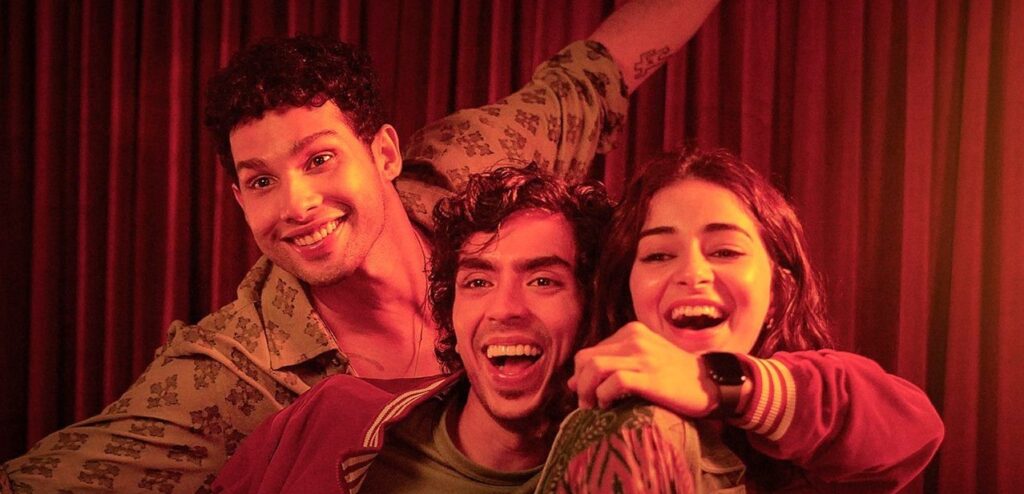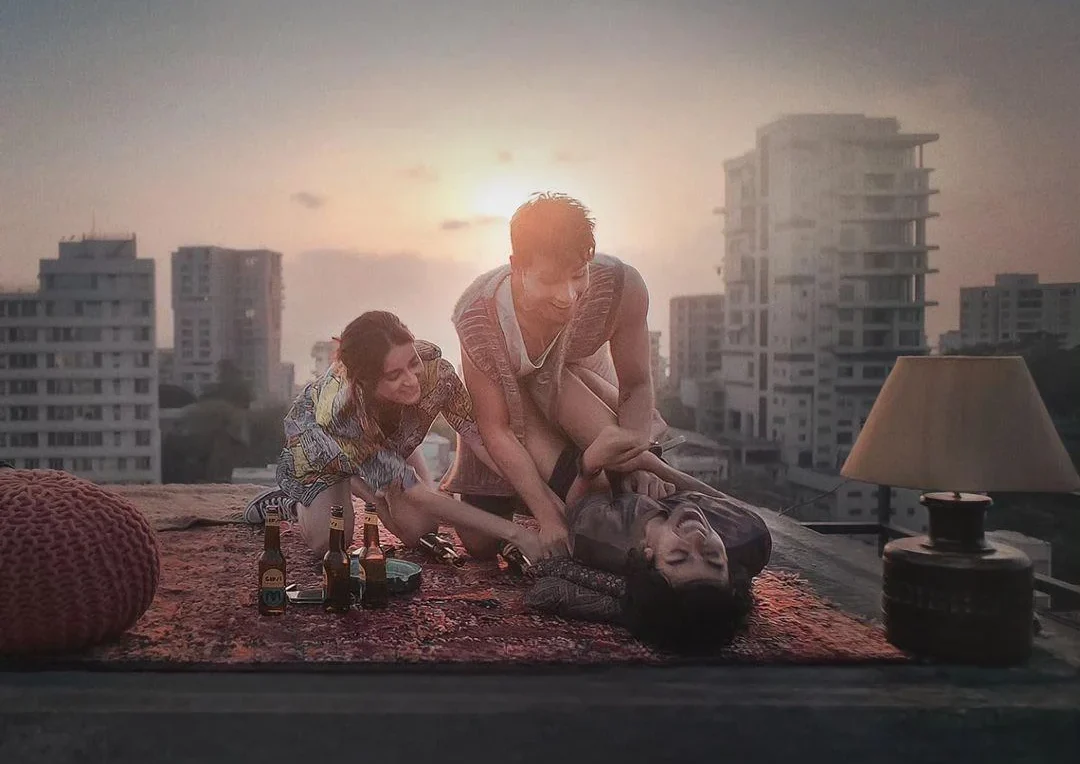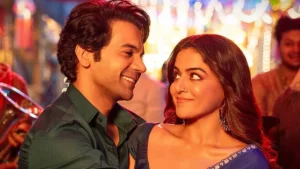
Kho Gaye Hum Kahan is a 135-minute-long Netflix original film. Ironically, it will be watched in roughly 260 minutes by its primary target audience if we take a ballpark average of their tendency to spend time on other devices. Directed by Arjun Varain Singh, the film is nowhere direct (and tacky) as an Akshay Kumar PSA that urges you to ditch the cig and get sanitary pads. Instead, it is a sharply observed spectacle of emotions that hits right in the gut if you are an urban or semi-urban youngster dealing with the daily pangs of social media, dreams, expectations, closures, indecision, wounds, and unreciprocated love.
Imaad (Siddhant Chaturvedi), Ahana (Ananya Panday), and Neil (Adarsh Gourav) may belong to different religions, financial bands, and professions, but their vibes are in sync. After decades of being around each other, the chemistry they develop among one another is too good to let go of for anything in the world. Imaad, a standup comedian, with the most generational wealth among the three, is hooked to a dating app and casual sex. Ahana, a corporate professional, is in a dysfunctional relationship and has no noticeable professional goals despite her qualifications and abilities. Neil is a personal trainer in a socially unacknowledged relationship with his Instagram influencer client, Lala (Anya Singh). Between the trio, we see a gamut of complexities develop as Kho Gaye Hum Kahan evolves into a tense, relatable, and sporadically heartbreaking drama.
For sure, it is set in Mumbai’s upscale high-rises and around people who might never have stepped onto a local train (aside from Neil’s parents). Yet, the screenplay (Arjun Varain Singh, Zoya Akhtar, Reema Kagti, Yash Sahai) is sensitive enough to let you empathize with its people. While I would attribute a lot to its clever integration of technology, the beauty of the film is in the way it chronicles three youngsters and their trial and error with life. Kho Gaye Hum Kahan is not a mindless exposé of social media. The theme stands out because Indian films turn blind to their relevance in modern society.

Of course, Arjun Varain Singh’s film does not bear a highly lived-in stamp. The sneakers are always right off the shelf. The mood lighting remains on point even on a rooftop. Be it in their living rooms or at a wedding party, the characters (Panday especially) dress up as they do on their social media (which is a compliment, on second thoughts). However, what we get is also not a Wake Up Sid equivalent where a wayward rich lad finds himself in the company of a manic pixie dreamgirl in a glossed-up middle-class apartment. It isn’t a Dil Dhadakne Do in terms of projection as there is no business empire awaiting to be taken over by a smart divorcee daughter whereas the disinterested son would rather go fly planes. Kho Gaye Hum Kahan emerges from a more intimate space where a lover questions his woman about the lack of social acknowledgment. It is a film that exposes the superficiality of what we see on social media – in your comments section or on an influencer’s Instagram reel. Lastly, it is also a film that enlightens us on the value of letting toxicity and indecision exit your being as you hold on to relationships that matter.
The film opens with Imaad leaving a woman’s house after a night of lovemaking, bidding a goodbye text in the taxi to instantly block her contact. Imaad’s name is Zeeshan on Tinder. In Neil’s words, he is a sex addict and is non-committal. Yet, not once does he or Ahana feel the need to question their friend’s questionable tendencies although as a bunch they always stand up for what is right. This also becomes the film’s only observable anomaly. The way it all comes around is a bit too simplistic in a film that was far more intricate from the beginning. The tears that Lala sheds or Simran’s calming smile do not sync well in a film that starvingly cooks up a gentle finale. No, it isn’t bad by any measure. The culmination lacks the spontaneity the screenplay had in place until the third act.
ALSO READ: ‘Talaash’: An Intense Noir-Mystery That Addresses Grief With Compassion
The writing in Kho Gaye Hum Kahan is largely a win despite the contrivances mentioned above and minor cinematic liberties, the film is made a lot more watchable by Singh’s filmmaking prowess. The debutant maker’s use of silences in some of the film’s most gutting moments has to be amongst the bravest of choices. The cozy, urban of the film may remind you a little of Gehraiyaan, but the DOP (Tanay Satam) and the editor (Nitin Baid) give us no reason to complain. The narrative runs at a brisk pace and the story flows effortlessly between Imaad, Ahana, and Neil’s unique issues.
The actors play off each other’s energies with superb flair. For all those who remember Chaturvedi and Panday for their ‘struggler memes’, the joke is on you because the duo is wonderfully at ease in the film – with each other and with the large cross-section of youth they represent. Panday is a great form in a comfortable framework and is in the right hands which helps her conjure up a layered, affecting performance. Chaturvedi’s gags land with the fluidity of a professional comedian whereas his rare emotional moments are heartwrenching. A first-rate shapeshifter, Adarsh Gourav raises the bar for himself with an astonishing turn as Neil. As Lala, Anya Singh grabs her first standout big-screen outing whereas Kalki Koechlin gives a gorgeous account of herself as Simran. Vijay Maurya is sweet in a noticeable cameo and Malaika Arora plays herself with remarkable sweetness in a bit part that lovingly parodies her off-screen persona.
In his maiden effort, Arjun Varain Singh makes us introspect on why Gen-Z and the late millennials behave the way they do. We realize how a good number of them are victims of bad childhoods but having access to therapists would educate them about better ways to live. They take time to commit and refuse to rust in abusive relationships for society’s sake, unlike their parents who wonder why they can’t get their acts together. They know a government job may not mint as many instant bucks as Instagram does. If a flirty text to a co-worker may land them in a MeToo soup, following somebody’s footsteps a la Amol Palekar in the ’70s might them you booked for stalking. How would they find love in an era of beauty filters and a gazillion choices on dating apps? As they thrive in this amusing mayhem, Kho Gaye Hum Kahan asserts how the generation, like every other, will try and figure ways out. The film is way better than the self-help book lessons it dishes out in the end credits. It makes me wonder if the creators are aware of the powerful story they ended up delivering. Either way, it is a blessing in disguise and an unexpectedly heartfelt year-ender for Bollywood.
Rating: ★★★★

